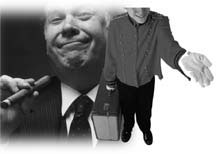Liang Hongfu
Reform Dickensian Hong Kong
By Hong Liang (China Daily)
Updated: 2007-05-18 15:20
 |
Large Medium Small |
 Economists in Hong Kong seem to agree that the widening gap between rich and poor is threatening to erode the social fabric on which the vibrant economy is imprinted.
Economists in Hong Kong seem to agree that the widening gap between rich and poor is threatening to erode the social fabric on which the vibrant economy is imprinted.
The latest warning came from Anthony Cheung Bing-leung, a member of the Executive Council. Citing "escalating class conflicts" as a cause of "social turbulence" a few years ago, Cheung wrote that the "widening wealth gap remains a concern" despite the economic recovery and the improved standing of the government.
As a member of the august policy making body, Cheung is not known to be an alarmist. So his rather blunt comments have brought into sharp focus the urgency of the issue.
Narrowing the wealth gap poses a particularly knotty problem for the Hong Kong government, which is expected by the business sector to adhere to its long-standing non-intervention policy. Any perceived attempt by the government to get involved in the redistribution of wealth would almost certainly be interpreted by the business sector as a brutal violation of sacrosanct free enterprise.
The opposition to the proposed minimum wage law shows that the hard-nosed business sector is not in any mood to yield an inch of ground in the fight to preserve the Hong Kong-style capitalist way of life.
Ignoring the risk of appearing heartless, they contend that the open economy of Hong Kong, free from undue government intervention, provides ample opportunity for capable people to move up the social ladder without government help.
Indeed, there is no shortage of business tycoons, successful professionals and senior civil servants who were born to poor families and grew up in low-cost housing estates. But these rag-to-riches anecdotes only tell part of the Hong Kong story. The other part tells the tale of people laboring hard all their lives for goals that proved ultimately elusive.
Read Cheung's almost Dickensian prose: "The wages of high-income groups are rising much faster than the lower classes, and even the middle classes are worried about downward mobility. Many grass-roots workers toil very long hours and there are occasional reports of some working themselves to death."
So it seems that the Hong Kong economic structure, though symbolized by gleaming office towers rather than dark Satanic mills, has spawned social dilemmas that are not too distant from those of Dickensian England.
"There is no denying that our (Hong Kong) economic structure easily renders low-skilled workers - with the least bargaining power in the labor market - unemployed or underemployed," wrote Cheung.
The wealth-gap dilemma is also hitting the young people and the lower-middle class, whose self-esteem, according to Cheung and others, has been seriously eroded by their declining earning power. Many of them have become so disillusioned that they have given up pursuit of the middle-class dream.
All eyes are now on the government. It needs to be seen as taking the lead in ensuring that the majority of the populace does not feel its well-being has been sacrificed in the economic recovery and the longer-term economic restructuring.
Nobody in Hong Kong is seriously lobbying for government handouts. But conscientious economists and political analysts are urging the government to introduce the minimum wage. This banner of social justice and fair play would give hope to the growing number of workers at the lowest rungs of the social strata.
Supporting a minimum wage would be tantamount to taking a collective stand against blatant exploitation of the weakest and most underprivileged citizens. This is our starting point in building a harmonious society where nobody needs to work to death attempting to earn a living.
E-mail: jamesleung@chinadaily.com.cn
(China Daily 05/18/2007 page10)
| 分享按钮 |